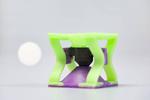Other

“Space debris threatens human safety in space and puts at risk critical space-based infrastructure that supports services such as the internet, global navigation and climate monitoring. A new project from the EPFL International Risk Governance Center (IRGC), in collaboration with …

“A cryogenic controller chip opens the door to solving the ‘wiring bottleneck’ and subsequently to realize a fully integrated, scalable quantum computer. A research from QuTech in the Netherlands, from Intel Corp and from EPFL professor Edoardo Charbon. A specially …

“Water can freeze from liquid to solid ice or boil into a gas. In the kitchen these “phase transitions” aren’t smooth, but their discontinuous nature is smoothed out at high pressure. An international team of physicists led by EPFL …

“Power converters play an essential role in electric vehicles and solar panels, for example, but tend to lose a lot of power in the form of heat in the electricity conversion process. Thanks to a new type of transistor developed …

“Scientists at EPFL and the University of Geneva have combined two powerful, cutting-edge techniques to uncover the physics behind an exotic phase transition that turns a metal into an insulator. The materials they looked at are rare-earth nickelates, which are …

“Chemical engineers at EPFL have developed a graphene filter for carbon capture that surpasses the efficiency of commercial capture technologies, and can reduce the cost carbon capture down to $30 per ton of carbon dioxide. One of the main culprits …

“By using 3D aerosol jet-printing to put perovskites on graphene, scientists at EPFL have made X-ray detectors with record sensitivity that can greatly improve the efficiency and reduce the cost and health hazard of medical imaging devices. Since Wilhelm Röntgen …

“Using the IBM Q computer, physicists at EPFL have verified for the first time the tight relationship between quantum entanglement and wave-particle duality, showing that the former controls the latter in a quantum system. “It is possible to do experiments …

“EPFL scientists have developed a metamaterial whose mechanical properties can be reprogrammed on demand and whose internal structure can be modified by applying a magnetic field. Over the past 20 years, scientists have been developing metamaterials, or materials that don …

“EPFL spin-off Aica has developed AI-based software that makes industrial robots easier to program and more capable of adapting. The software is designed in a modular format so that operators can build a customized application based on their needs …
